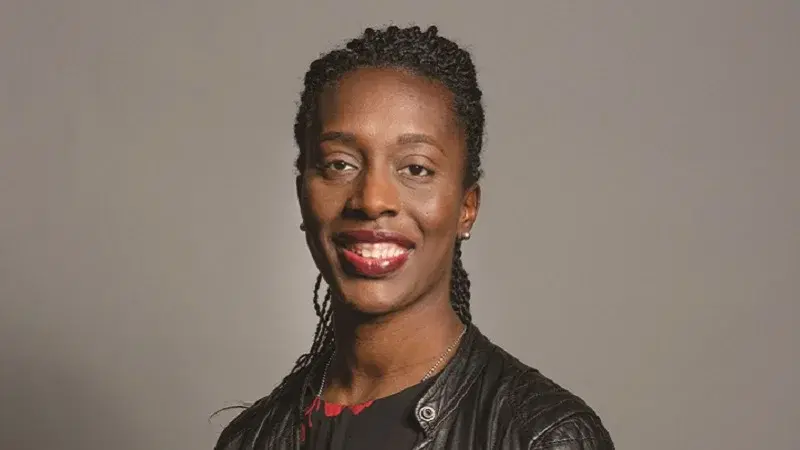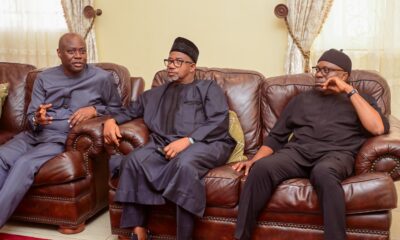News
AfDB Invests $10.9bn In Nigeria
The Director-General of West Africa Region, African Development Bank (AfDB), Lamin Barrow, says the banks’s cumulative financing approvals in Nigeria stands at 10.9 billion dollars.
Barrow said this at the Second Interactive Session and Workshop on Developing Bankable Business Proposals/Business Plans for Youths in Agriculture on Monday in Abuja.
The Tide source reports that the event is being held as part of the activities to celebrate the Bank’s 60th Anniversary with stakeholders.
“Over the last 60 years, the Bank has grown into a trusted partner and the continent’s premier development financial institution.
“Our cooperation with Nigeria has expanded over the years, especially considering that Nigeria is the largest shareholder.
“Since it started operations in the country, cumulative financing approvals has reached 10.9 billion dollars and our portfolio currently stands at 4.9 billion dollars supporting projects in the public and private sectors,” he said.
Barrow said the AfDB’s President, Dr Akinwumi Adesina, upon assumption of office eight years ago, prioritised the High 5–of Power, Feed, Industrialise, Integrate and Improve the quality of life for the people of Africa.
He said these were the accelerators for achieving the SDGs and the targets in the African Union’s Agenda 2063.
According to him, the projects and programmes supported during this period have impacted over 400 million people.
He said: “this Interactive Session provides an opportunity to discuss ways of addressing the many challenges faced by youths and women in Agro-business, including access to finance.
“We applaud the Federal Government of Nigeria in spearheading various initiatives and programmes to increase production and productivity in the sector.
“And its efforts to create job opportunities for the youths and women, and combat food insecurity in the wake of the high food inflation currently witnessed in Nigeria.”
According to him, the workshop will enhance the knowledge and skills of participants in preparing bankable proposals to unlock financial support for their enterprises.
Meanwhile, Mrs Marie-Laure Akin-Olugbade, AfDB’s Vice-President, Regional Development, Integration and Business Delivery Complex, during her key note presentation, identified agriculture as a business.
“We are here to reimagine Africa’s future. A future powered by agriculture that backs the perception of agriculture as a low-income, low-status occupation that attracts only 21.5 per cent of youth.
“Where Women, comprising 50.8 per cent of Africa’s population, continue to face systemic challenges including gender-based discrimination, marginalisation, violence, and unequal access to education, land, resources, opportunity and a voice.
“Africa is home to 65 per cent of the world’s remaining arable land enough to feed 9.5 billion people in the world. Agriculture is a business,” she said.
According to the vice-president, growth in the agricultural sector is two to four times more effective in reducing poverty than growth in other sectors.
She said by 2030, Africa’s food and agriculture market is projected to be valued at 1 trillion dollars.
“These numbers alone demonstrate the central importance of agriculture as a cornerstone of Africa’s economy and a solution to the continent’s and the world’s food insecurity.
“The question, therefore, is not whether Africa can feed itself, it is how quickly we can make it happen,” she said.
While reiterating AfDB’s efforts towards food security, Akin-Olugbade said the bank was collaborating with partners to allow private agribusinesses to establish industries that processed and add value to agricultural commodities.
“So, to our policymakers, I say this: The time for bold action is now. Every policy should ask: Are we going beyond empowering to invest in our youths?
“How does this support our women farmers? How does this move us closer to food sovereignty?
“To the youths and women: You are not just the future of Africa’s agriculture. You are its present. Your innovation, resilience, determination are the seeds from which a new African agricultural revolution will grow,” she said.
The vice- president said that by working together and focusing on these transformative initiatives, we would unlock the full potential of Africa’s agriculture.
She then expressed AfDB’s commitment to nurture the growth, ensure that Africa’s future in agriculture is bright and prosperous for all.
The Tide source reports that the event was attended by government officials, partners, women and youths in agriculture and stakeholders in the agric value chain.
News
Let’s Approach Regional Development Issues Differently – Fubara …As S’South Govs Host Fubara To 50th Birthday Celebration

Rivers State Governor, Sir Siminalayi Fubara, has sued for a change in the current approach adopted by South South Governors in their pursuit to achieve holistic regional development and economic prosperity.
The governor insisted on de-emphasis in vested individuals’ political interests while looking at the bigger picture of achieving enduring regional integration that will strengthen unity of purpose to change the trajectory of development in the region.
Fubara made the appeal during the meeting of Governors of South-South States, under the auspices of BRACED Commission, at the Bayelsa State Government House in Yanagoa on Tuesday.
This was contained in a statement by the Chief Press Secretary to the Governor, Nelson Chukwudi.
BRACED is an acronym for Bayelsa, Rivers, Akwa Ibom, Cross River, Edo and Delta.
He said: “I want to appeal that if we have to succeed in this drive, we need to keep our political differences aside and understand that the struggle, as at today, is for posterity, for the development of our region.
“It is really sad that in Niger Delta that is the economic base of this country, the construction of a road that you tagged ‘East-West Road’ could be an issue, that we need to beg, protest, and complain to get it fixed. I don’t think it is proper.”
Governor Fubara stated that it is not that the federal authorities do not understand that Niger Delta needs the road but quickly added that they have seen that even the people of the region do not take themselves seriously.
The governor said the moment Niger Delta people stopped playing to the gallery, and place value on themselves, outsiders will have no option than to accord the region and its people due regard.
Fubara said: “On my part, I want to say this: This is not the first time we are meeting. For me, I followed the course of the region meeting in a forum that we tagged “BRACED Commission.”
“BRACED Commission is also one of the bodies that was constituted at that time to support and work out development strategies for this region. But what I am seeing today is just limiting this meeting to only BRACED COMMISSION.
“We need to widen the scope where other leaders of the region should be part of the discussion of the development of the region, and I think this is the direction that will help the region.”
Reading the Communique of the meeting, the new Chairman of the Forum of Governors of South-South States, and Governor of Bayelsa State, Senator Douye Diri, said they support the Federal Government Tax Reform Bills, and urged President Bola Tinubu to extend the Value Added Tax (VAT) sharing percentages to oil and gas derivation.
He stated the Forum’s request to the Federal Government to urge relevant stakeholders and agencies to extend remediation of polluted environment ongoing in Ogoni land to other impacted communities and States in the region.
Governor Diri also said that the Forum resolved to establish a structural regional security network to enhance safety and security, foster stable Niger Delta region conducive for economic growth and prosperity.
Highlight of the event was the hosting of Governor Fubara to a surprise 50th Birthday celebration by the Governors of South-South States at the Government House in Yenagoa.
News
Fubara Lauds Tinubu For Setting Up Education Load Fund … Vows To Ensure Rivers Benefit Maximally From Scheme

The Rivers State Government has applauded President Ahmed Bola Tinubu for conceiving the idea of setting up the Nigeria Education Loan Fund (NELFUND) which has opened up opportunities for youths to acquire tertiary education irrespective of their financial status.
Rivers State Governor, Sir Siminalayi Fubara, gave the commendation while playing host to a delegation from NELFUND who came on an advocacy visit to the Government House in Port Harcourt on Tuesday.
Represented by his deputy, Prof. Ngozi Nma Odu, Governor Fubara said in developed countries it is common for people to go through school with loans which they sometimes pay all throughout their lives, noting that “for us, it is more accessible and more friendly because you would be required to pay back the loan two years after your National Youth Service.
“It is a win-win situation; it is a situation where the youths in Nigeria should not say because my parents are poor or passed away I cannot improve on my educational growth. This offers them a golden opportunity and I am glad you came for this advocacy.”
The governor urged NELFUND to intensify its advocacy to let the people know how they can benefit from it, adding that it is more important when talking about vocational institutions.
“If you look at the developed countries it is people that went to the vocational schools that make so much money, because it is pricey to get somebody to do anything, we need to instil this into our people, our youths, because people sometimes tend to look down on people that went to vocational schools, it should not be,” he said.
Fubara expressed delight with the NELFUND programme and assured that the State Government would do whatever it can to ensure Rivers State benefits maximally from the scheme.
In his remarks, the Managing Director and Chief Executive of NELFUND, Dr. Akintunde Sawyer, informed the governor that they were in Rivers State to seek the support of the State Government towards the loan, stressing that President Tinubu has directed them to ensure no Nigerian student who has the ability and desire to get educated at tertiary level is denied the opportunity due to lack of funding.
He explained that the scheme provides interest-free loans to students who apply, adding that these loans are not repayable until two years after their Youth Service when they must have gotten a job.
News
UK Appoints British-Nigerian As Trade Envoy To Nigeria

A British-Nigerian politician, Florence Eshalomi, has been appointed as the United Kingdom’s trade envoy to Nigeria.
Her appointment makes Eshalomi the second Nigerian to hold the position.
Confirming her appointment on X on Tuesday, she wrote: “It is an honour to have been appointed as the United Kingdom’s Trade Envoy to Nigeria.
“I’m looking forward to building on my close ties with Nigeria to promote a strong and flourishing economic relationship between our two great nations.
“I am looking forward to strengthening the UK’s relationship with Nigeria to explore shared growth and opportunities for both countries.”
Announcing the appointment in a statement on Tuesday, Jonathan Reynolds, the UK’s Business and Trade Secretary, said the decision was aimed at attracting investment into the UK and boosting economic growth.
“I’ve launched a new team of trade envoys who will use their experience, expertise, and knowledge to unlock new markets around the world for British businesses, attract investment into the UK, and ultimately drive economic growth,” Reynolds said.
Eshalomi, 44, is an MP representing the Vauxhall and Camberwell Green constituency.
She holds a Bachelor of Arts (Hons) in Political and International Studies with Law from Middlesex University.
-

 News4 days ago
News4 days agoFRSC Records 9,570 Road Crashes, Arrests 21,580 Offenders In 2024
-
Niger Delta2 days ago
A’Ibom Police Enforces Anti-Grazing Law
-
Nation1 day ago
Council Boss Flags Off Projects
-
Niger Delta4 days ago
Ag. Paramount Ruler Restates Stance On Recognition … As Factional Tussle Intensifies In Bayelsa Community
-
Politics2 days ago
Thugs Clash Over Anyanwu, Ude-Okoye At PDP BoT Meeting
-
Business1 day ago
LCCI Urges FG To Front Manufacturing Reforms
-

 Niger Delta4 days ago
Niger Delta4 days agoNEITI Eyes Energy Sufficiency Through PH, Warri Refineries
-

 Politics1 day ago
Politics1 day agoPDP Governors’ Forum Pays Condolence Visit To Makinde …Over Demise Of Elder Brother

